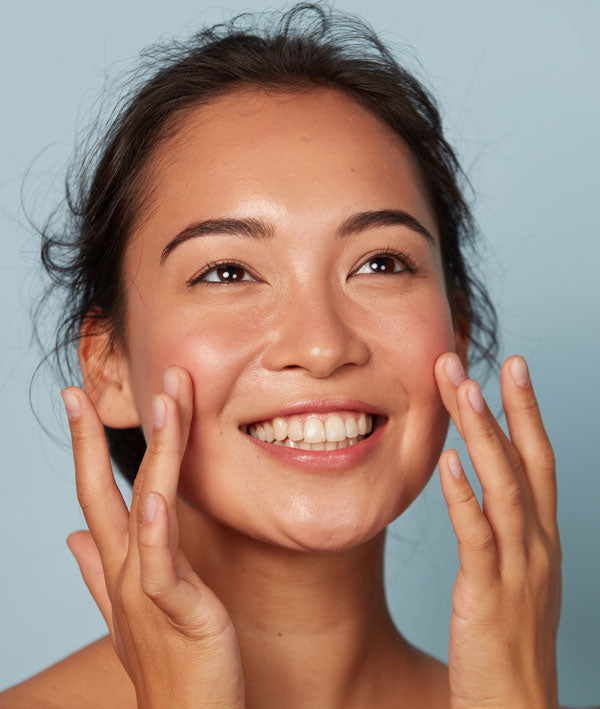Trying to understand the world of skincare can be overwhelming –especially when simultaneously dealing with the changes in the skin that typically happen during our teen years. Consider this the ultimate guide to approaching skincare as a teen. We’ll discuss the products teenagers should be using, as well as the best routine for maintaining healthy and clear skin.
How to Understand Your Skin Type
The first thing every teen needs to do when creating a skincare routine is identify their skin type. Here are the main skin types, as well as the unique characteristics of each:
Oily Skin: Many teens battle oily skin – a skin type that overproduces oil (also known as sebum). With this skin type, the entire face may look and feel shiny or greasy. Teens with this skin type are also especially prone to enlarged pores and acne.
Dry Skin: While oily skin is common amongst teens, some also deal with dry skin. This skin type produces far less oil than other skin types, making the complexion especially prone to rough patches, flakiness, and an uncomfortable parched feeling.
Combination Skin: Combination skin sits between oily and dry skin. With this skin type, the T zone (the forehead, nose, and chin) may be oily, but the other sections of the face tend to be drier. This skin type may also be prone to breakouts, particularly in oily areas.
Sensitive Skin: Sensitive skin is especially prone to signs of aggravation, including redness and irritation. Keep in mind that you can have sensitive skin that is also dry, oily, or combination.
Normal Skin: Normal skin doesn’t produce an excess or a lack of oil. Rather, it makes the optimal amount of oil to keep the skin balanced and healthy. This skin type also isn’t especially prone to breakouts or other skin issues.
Essential Skincare Products
When a teenager is building out their skincare routine, there are some key products they will want to use to maintain a healthy complexion.
Face Wash
A face wash will whisk away impurities (such as dirt, bacteria, and excess oil) from the skin, getting rid of potential pore cloggers and preparing the skin for the next step in your routine. Teens with drier skin will want to reach for a non-foaming, hydrating cleanser, whereas those with oilier skin should use a lightweight foaming face wash.
Moisturizer
Everyone needs a moisturizer in their routine. A moisturizer will replenish the skin’s moisture levels while keeping the skin barrier strong and healthy. Drier skin types will benefit from a richer cream, whereas oilier skin types can use a lightweight gel or gel-cream moisturizer.
Serum
Teens may also wish to work a serum into their routine to target specific skin issues. For example, a teen battling dehydration might want to use a hydrating hyaluronic acid serum to douse the skin with water. On the other hand, a teen dealing with post-inflammatory hyperpigmentation (AKA dark spots) from previous breakouts may want to try a brightening vitamin C serum.
Sunscreen
Every teen should get into the habit of wearing sunscreen on a daily basis. UV rays can harm the skin, triggering damage that will start to visibly appear later in life. If you start being diligent about sunscreen application in your teen years, your future self will thank you!
Addressing Common Concerns
There are a few common skin issues that tend to plague teens. If you’re facing any of these concerns, here is what you can do to address the problem head-on:
Excess Oil: Hormonal fluctuations can cause the oil glands to go into overdrive, resulting in especially shiny skin. Try using a mattifying moisturizer during the day to help keep shine at bay. Additionally, make sure you’re cleansing your skin both morning and night to clear away excess oil.
Acne: Excess oil is often accompanied by breakouts. If you have acne-prone skin, you can help prevent acne by using treatments with active ingredients like salicylic acid, retinol, or benzoyl peroxide. A spot treatment can also be beneficial for reducing active pimples, as it will treat the blemish without drying out the entire face.
Irritation and Redness: Many teens also face skin that is particularly reactive and irritable – especially if they are also battling acne. While it can be tempting to treat active breakouts with strong treatments, over application can lead to red, irritated skin. When it comes to treating acne, be sure to use treatments conservatively to reduce your risk of aggravating the skin. Additionally, look for products made with ingredients that soothe the skin and reduce redness, such as bisabolol, green tea, aloe, licorice root, and centella asiatica.
Creating a Skincare Routine for Teens
Creating a routine can feel overwhelming – especially when you’ve never used any skincare products! The key thing to keep in mind when putting together your routine is that simple is best (especially at first!). There is no need to go out and buy a ton of new products. In the beginning, try just a couple products, and then expand from there.
To start off, create a simple foundational routine with a face wash, moisturizer, and sunscreen. Once you get in the habit of using these products regularly, you can try adding new products, such as serums and acne treatments. Doing so will allow you to adapt to your skincare routine without feeling overwhelmed by using too many products at once.
Healthy Habits for Good Skin
To finish up, here are a few habits that you’ll want to develop to maintain healthy and happy skin:
- Cleanse daily to wash away impurities and prevent breakouts. Teens with drier skin may find that only cleansing at night works best for them, whereas teens with oilier skin will typically want to cleanse both morning and night.
- Don’t overwash your skin. It can feel tempting (especially if you have oily skin), but this can actually dehydrate your skin and trigger it to produce even more oil in response.
- Wear sunscreen daily (and be sure to reapply!) to keep your complexion protected against damaging UV rays.
- Be consistent with your routine. Optimal results come from regular use of your skincare products!







